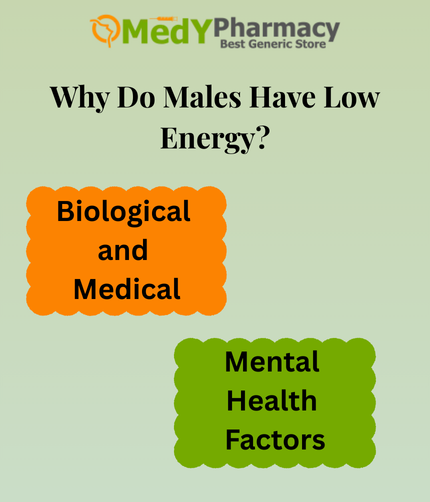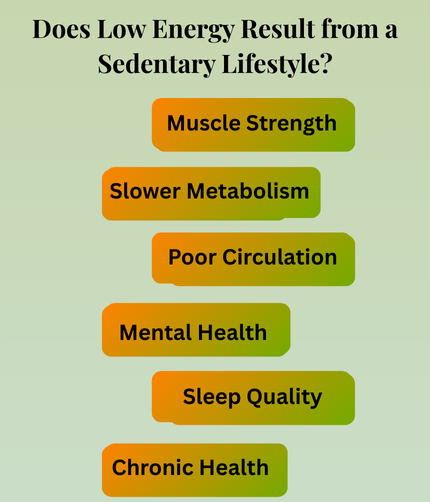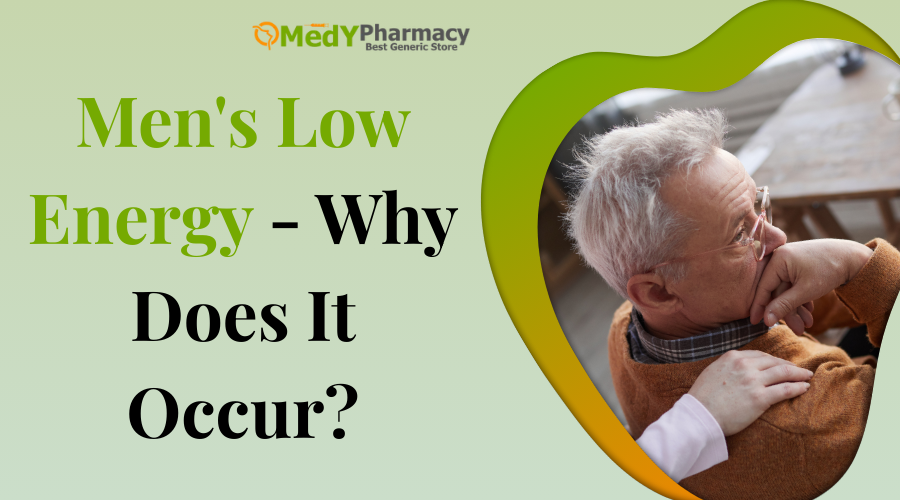Introduction:
Do you have chronic fatigue that makes it difficult for you to finish easy, low-effort tasks?
This is an issue if you have these downtimes too frequently. Everyone has these periods when their batteries are low and they need to take a break to recharge.
Given the physical toll that contemporary living may have, these levels in men are not unusual. But if men’s low energy is ignored, it can have an impact on their sex life and other aspects of their lives.
Feeling tired or ill is a typical occurrence. Most of us don’t feel like we’re as productive and efficient as we typically are. Usually, the cause is dismissed as something as trivial as working excessive hours or not getting enough sleep.
However, there are certain things you might not notice, even if the majority of us would wake up with a cup of coffee. Although this is very normal, you should sometimes examine your health and lifestyle more closely if it starts to happen again.
Men who suffer from medical issues like sleep apnea and low testosterone may also have poor energy levels.
Due to the hectic lives that many people lead, many men experience fatigue and overwhelm daily. Lifestyle choices, including nutrition, exercise, and sleep habits, can all contribute to low energy levels.
What Is Men’s Low Energy?
A chronic sense of physical and mental exhaustion that can impair motivation, productivity, everyday functioning, and general quality of life is referred to here. It is more than just feeling worn out after a long day; it is a more profound, long-lasting form of fatigue that is not alleviated by rest or sleep.
Men with low energy can show themselves in several ways, such as persistently lacking motivation, diminished physical stamina, trouble focusing, impatience, and even a decrease in libido or sexual performance.
Stress or inadequate sleep might cause it to be temporary, or it can develop into a chronic issue brought on by long-term medical disorders, hormone fluctuations, or bad habits.
Men’s low energy tends to persist and might seem overpowering, even in the absence of obvious physical exertion, unlike the typical fatigue that follows a long day of strenuous exercise.
It might be difficult to determine when this started for many guys because it may appear gradually. Other people could experience an abrupt decline in their typical motivation and vigilance.
Though it can impact males at any age, it is also frequently linked to aging, especially because of the slow decrease in testosterone.
This may have a detrimental effect on a man’s relationships, productivity at work, mental health, and feeling of well-being if left untreated.
In What Ways Does Low Energy Vary From Typical Fatigue?
Despite their apparent similarities, these conditions range greatly in their aetiology, duration, and effects on day-to-day living. Usually, weariness is a temporary, normal reaction to physical strain, emotional stress, or sleep deprivation.
Usually, rest, a restful night’s sleep, or a brief recuperation time ease it. After the problem is addressed, low energy levels soon return, and it usually doesn’t affect general functioning.
This is a more chronic, long-lasting disease that is difficult to cure, even with enough sleep or rest. It can have an impact on the mind, emotions, and body, and it might seem like a persistent feeling of fatigue or sluggishness.
This is different from normal weariness in that it might get worse over time and calls for a more thorough investigation to find and address its underlying causes.
Men with low energy frequently state that they are unmotivated, have trouble focusing, have lost interest in once-enjoyed hobbies, and feel generally exhausted or burned out.
At What Age Does Low Energy Usually Start To Affect Men?
Men may be affected as early as their late 20s or early 30s, but in their 40s and beyond, it becomes more obvious and prevalent.
The steady drop in testosterone levels, which usually occurs approximately 1% per year after the age of 30, combined with changes in lifestyle, heightened stress at work and home, and the early beginning of age-related health problems, frequently accompany this transition.
- Degree of physical activity
- Sleep quality and diet
- Stress and psychological well-being
- Chronic conditions present
- Drug abuse
Some men in their 20s may even experience low energy as a result of sleep issues, depression, or excessive work, while others maintain their low energy levels into their 50s or 60s by maintaining healthy lifestyles.
Which Medical Disorders Are Associated With Men’s Low Energy?
- Low Testosterone
- Hypothyroidism
- Sleep Apnea
- Anxiety Disorders
- Chronic Fatigue Syndrome
- Cardiovascular Disease
- Anemia
- Autoimmune Diseases
Other serious medical reasons include sleep apnea, a disorder that causes breathing problems while you’re asleep, which results in poor oxygenation and restless nights. Even after a full night’s sleep, men who suffer from sleep apnea frequently wake up feeling exhausted.
Fatigue, a lack of motivation, and trouble focusing are physical symptoms of mental health disorders such as anxiety and depression.
Chronic weariness and erratic low energy levels are the results of metabolic diseases like diabetes, which alter how the body consumes and processes glucose.
Even shortages in vitamins and minerals, particularly those of vitamin D, B12, iron, and magnesium, can deplete energy and are occasionally missed during regular examinations.
Restoring low energy and receiving the appropriate therapy depend on identifying whether weariness is associated with an underlying illness.
Thyroid problems, particularly hypothyroidism, can also slow down the body’s metabolic processes, which can lead to weight gain, exhaustion, and mental haze.
Why Do Males Have Low Energy?
Reduced testosterone levels, the main male sex hormone that controls mood, low energy, muscle mass, and sexual function, are among the most frequent biological causes.
Fatigue, a lack of desire, and difficulty concentrating might result from the normal decline of testosterone, which starts at age 30 and continues to occur progressively every year.
Certain drugs, smoking, and excessive alcohol use can all further reduce low energy levels. Finding the underlying reasons for this is crucial for successful treatment and recovery since it frequently stems from several overlapping issues.
Men with erectile dysfunction may find it difficult to get firm erections due to a lack of endurance, for instance, according to research. In these situations, it is frequently observed that the man will have to rely on using sildenafil tablets.

- Biological and Medical Causes
The most important biological and medical reasons for men’s low energy are frequently hormone imbalances, chronic illnesses, or malfunctions in vital body systems. The disease known as hypogonadism, or low testosterone, is one of the main physiologic reasons.
Energy, mood, desire, and muscle upkeep are all regulated by this important male hormone. Men frequently suffer from chronic weariness, diminished physical performance, and a discernible loss in motivation when levels fall in response to stress, age, or medical issues.
On the other hand, anaemia, particularly that caused by iron or vitamin B12 deficiency, lowers the red blood cells’ ability to transport oxygen, which causes muscles and organs to work harder and exhaust more quickly.
When dealing with chronic low energy, it’s important to treat underlying health concerns because these medical and biological disorders can occur alone or in combination.
- Mental Health Factors
Men who have low energy frequently exhibit chronic exhaustion, lack of motivation, anger, and a generalised sensation of burnout, which are all symptoms of mental health disorders. One of the mental health disorders most frequently linked to low energy is depression.
In addition to melancholy or emotional anguish, it frequently presents as a deep, enduring exhaustion that doesn’t go away with rest. Men suffering from depression may feel mentally and physically exhausted, lose interest in once-enjoyed activities, and have trouble focusing.
Chronic stress also has a significant role. Men who endure long-term stress, whether from relationships, their jobs, or money problems, may face a persistent loss of mental and physical vitality. Stress triggers the “fight or flight” reaction in the body, which gradually depletes energy stores, particularly if the body is not allowed time to recuperate.
Emotional burnout and mental exhaustion may result from this perpetual level of attention. However, men who are overburdened by their jobs or personal obligations frequently experience burnout, a condition of physical, emotional, and mental depletion brought on by extended stress or overwork.
Indications of Low Energy
There are several physical and mental manifestations of low energy in males. Beyond ordinary fatigue, it can have a major impact on general health. Common symptoms and indicators of low energy include the following:
- Tiredness
- Weakness
- Muscle cramps
- Feeling sleepy
- Drowsy
- Dizziness
- Hallucinate
- Sleepiness
Difficulty getting to sleep, remaining asleep, or feeling exhausted after a long night’s sleep. Fatigue can result from conditions like sleep apnea, even after spending a lot of time in bed.
This is commonly accompanied by frequent or chronic headaches, which can be brought on by stress, sleep issues, or dehydration.
A discernible decrease in physical activity or movement, frequently due to fatigue or lack of motivation.
Using stimulants like coffee, low energy drinks, or other substances to stay awake when they don’t feel completely rested or invigorated.
Having trouble focusing, being motivated, or having the physical stamina to do daily tasks or fulfil job deadlines.
An urge to avoid social situations, friends, or family because one is uninterested or lacking in energy.
You can also discuss using Zudena 100 mg tablet with your doctor if you already have additional health issues, such as ED.
What Role Does Ageing Have in Low Energy Levels?
A decrease in low energy levels can be caused by several normal biological and physiological changes that occur in men as they age. Although it is not a necessary aspect of ageing, it does grow more prevalent as the body experiences different age-related changes.
Men frequently feel symptoms such as weariness, less motivation, diminished physical endurance, and even mental disorders when these levels decline, making it more difficult to maintain an active and motivated lifestyle.
Along with hormonal shifts, ageing also causes a natural slowdown in metabolic rate. If food and exercise habits don’t adapt to this adjustment, the body will burn fewer calories and use low energy more efficiently, which will make you feel more exhausted.
Ageing can also affect the cardiovascular system, lowering oxygen supply to the muscles and organs and the heart’s capacity to pump blood effectively. Men may get more exhausted even when performing daily tasks as a result of this.
While ageing can have a role in decreased low energy levels, lifestyle choices can also have a big influence. A balanced diet, regular exercise, proper sleep hygiene, and mental health care can all help lessen the negative impacts of ageing that sap vitality.
Does Low Energy Result from a Sedentary Lifestyle?
Yes, both men’s and women’s health are significantly influenced by a sedentary lifestyle. Chronic weariness, diminished stamina, and general this can result from the accumulation of various detrimental consequences that occur when the body is not frequently engaged in physical exercise.

- Muscle Strength
Muscle strength is essential for preserving general vitality and energy levels. Not only do muscles facilitate movement, but they are also necessary for carrying out daily chores, preserving posture, and sustaining critical metabolic processes.
A sedentary lifestyle, lack of exercise, or age can all cause muscular weakness, which impairs the body’s ability to accomplish physical activities and can have a cascade of negative effects that deplete energy levels.
Additionally, unstable posture and weak muscles make even simple activities more taxing. Long-term standing, walking, and grocery carrying become more challenging and demand more energy and effort, which eventually depletes general endurance.
- Slower Metabolism
The body turns food into energy through a sequence of biological reactions known as metabolism. A slower metabolism can directly affect energy levels since it causes the body to burn calories and turn them into energy more slowly. Naturally, people’s metabolisms slow down as they get older, usually beyond the age of thirty.
The body’s capacity to control insulin and blood sugar levels can also be impacted by excess weight, which can cause changes in energy levels throughout the day. It can be challenging to be active and involved in everyday activities when blood sugar levels are fluctuating because of the resulting fatigue, irritation, and low stamina.
The body’s capacity to supply oxygen and nutrients to muscles and organs is weakened by a slower metabolism, which can also result in diminished circulation and a heightened sense of exhaustion.
- Poor Circulation
This can be greatly influenced by poor circulation, which impairs the body’s capacity to efficiently carry waste materials, nutrients, and oxygen through the bloodstream. Giving the muscles, organs, and tissues the resources they require to operate correctly depends on circulation.
The body needs oxygen to produce energy, particularly in muscle cells, which depend on it to produce the energy required for movement and physical activity. Blood flow slows down, and muscles and other tissues receive less oxygen when circulation is weak. As a result, the body’s ability to produce energy is reduced, and even basic physical activities might wear you out.
- Mental Health
Because physical vitality is closely linked to emotional and psychological well-being, mental health is a significant factor in influencing energy levels. Fatigue on both an emotional and physical level is frequently a sign of poor mental health.
People who are depressed lose interest in once-fulfilling pursuits, including working, exercising, and interacting with others. This lack of drive to participate in life’s activities makes feelings of exhaustion and low energy even worse.
Even while not physically exerting oneself, a person may feel exhausted due to the continual level of vigilance and mental pressure that comes with stress. Burnout can occur rapidly as a result of mental tiredness brought on by continual worrying, multitasking, or handling stress.
- Sleep Quality
Sleep is necessary for concentration, memory, and cognitive function. Insufficient sleep can cause trouble focusing, slower response times, and poor decision-making. This mental haze can lead to emotions of fatigue and irritation as well as decreased productivity.
This disorder frequently results in sleep disturbances by causing an insatiable need to move the legs as you sleep. Consequently, those who suffer from RLS often have trouble sleeping, which leaves them feeling exhausted during the day.
Mental exhaustion may result from this, as it may affect the brain’s capacity to regulate emotions and ideas. As a result, it may be more difficult to manage everyday pressures, leading to fatigue.
As a result, the body produces fewer of these proteins, which impairs immunity and increases vulnerability to disease.
- Chronic Health
Over time, chronic illnesses can have a major impact on a person’s energy levels. These chronic illnesses, which frequently need continuous care, can cause weakness, chronic tiredness, and overall weariness.
The body may accumulate fluid as a result of heart failure, particularly in the lungs, belly, and legs. Feelings of fatigue and heaviness may result from this, making it challenging to maintain an active lifestyle.
Hypothyroidism can cause joint discomfort and muscular weakness, which makes it more difficult to maintain an active lifestyle and adds to tiredness.
Excessive weariness can result from both cancer and its therapies. One of the most crippling side effects of cancer is weariness, which can last for a long time after therapy is finished.
To determine the reason for low energy, what tests are performed?
This can be caused by a variety of circumstances, including medical issues and lifestyle choices. Usually, a medical professional will begin with a thorough medical history and physical examination. Depending on the symptoms, the doctor may suggest several tests.
- Blood Tests
- Sleep Studies
- Electrocardiogram
- Echocardiogram
- Hormone Level Testing
- Imaging Tests
- Screening
- Urinalysis
A thorough approach is necessary to identify the source of low energy, which may involve several tests in addition to a physical examination and medical history.
Anaemia, thyroid dysfunction, heart disease, sleep disorders, and mental health diseases are among the typical underlying problems that are identified through blood testing, sleep studies, heart function evaluations, and thyroid and hormone level assessments.
To check for physical anomalies, such as tumours, neurological disorders, or brain disorders that could be influencing energy levels.
To assess the effectiveness of the heart’s pumping action and look for diseases like heart failure, which can lead to exhaustion because of inadequate circulation.
This may be caused by heart attacks, irregular heartbeats, or heart failure symptoms.
After identifying the problem, the right course of action may be taken to assist in improving general health and energy levels.
How Are Guys With Low Energy Treated?
Since there are many possible causes of low energy in males, such as lifestyle choices, mental health disorders, and physical illnesses, treating the underlying cause is crucial.
Addressing the specific illness is usually the first step in treatment if the underlying reason is medical, such as diabetes, heart disease, thyroid dysfunction, or anaemia.
For instance, depending on the kind of anaemia, males may receive B12 injections or iron supplements, while those with thyroid problems may be offered thyroid hormone replacement treatment.
Diabetes treatment may include lifestyle modifications, including better eating and exercise, as well as the use of insulin or oral drugs to control blood sugar.
If sleep apnea is the cause of low energy, CPAP machines may be used to enhance the quality of sleep, or in more extreme situations, surgery may be necessary.
This can also be significantly reduced by lifestyle changes, including better sleep hygiene, frequent exercise, stress reduction, and diet optimisation, in addition to these medical therapies.
Restoring energy and enhancing general well-being may occasionally require a mix of medical treatment and lifestyle modifications. In each situation, people must collaborate closely with medical experts to correctly identify the underlying problem and follow the best course of action.
Can low energy be caused by dehydration?
Because fewer oxygen and nutrients are getting to the muscles and organs, the heart must work harder to pump blood, which can create feelings of exhaustion.
Your metabolism may be slowed down by dehydration, which might make bodily functions like energy generation take longer or be less effective. As a result, the body may find it more difficult to sustain high energy levels all day long.
Muscle cramps or weakness can result from dehydration. Muscles may not function at their peak when they are dehydrated, which can cause weariness, especially after exercise.
You might need to rehydrate electrolytes if you are perspiring a lot from activity or the heat. Consuming electrolyte-rich liquids, such as coconut water or sports drinks, might aid in reestablishing equilibrium.
Additionally, foods like lettuce, cucumbers, oranges, and melons might help you stay hydrated.
Be mindful of the colour of your urine. It could indicate dehydration and the need for extra fluids if it’s dark yellow.
Maintaining adequate hydration is crucial for preserving general energy levels and wellbeing, and this may undoubtedly contribute to low energy. It might be helpful to examine and modify hydration practices if dehydration is a common problem.
Does Low Energy Represent a Symptom or a Medical Condition?
Generally speaking, this is seen as a symptom rather than an independent medical issue. It frequently indicates that something is not working as well as it should in the body or mind.
Numerous things might cause it, ranging from underlying medical issues to lifestyle decisions. Although chronic or extreme exhaustion is normal, it may be a sign of a more serious problem.
This is a frequent symptom; if it persists, is not explained, or is accompanied by other symptoms such as discomfort, unexplained weight loss, or significant mood swings, it may also indicate that medical help is necessary. Someone may have fibromyalgia or chronic fatigue syndrome, for instance, if they continue to feel exhausted even after getting enough sleep and eating a healthy diet.
Usually, this is a symptom that indicates a different underlying illness or lifestyle choice. To find out if it is a symptom of a more serious health problem, it is crucial to speak with a healthcare provider if it continues.
If I have low energy, when should I see a doctor?
- Anemia
- Hypothyroidism
- Diabetes
- Depression
- Sleep disorders
- Heart disease
- Cancer
When low energy becomes severe, chronic, or begins to interfere with your day-to-day activities, you should consult a physician. While occasional exhaustion is common, particularly following a restless night, a demanding day, or vigourous exercise, it’s worth getting checked out if you experience fatigue regularly without a known cause.
A complete review by a medical professional can identify the underlying reason and may involve blood testing, sleep disorder screens, and mental health assessments.
In addition to reviving your vitality, early management can avert more severe issues later on. Do not disregard your fatigue if it seems unusual, persistent, or is becoming worse; instead, speak with your physician.
In addition to feeling exhausted, men who use sildigra 250mg tablets may have a decrease in sex drive due to their low stamina, which may make it more difficult for them to get firm erections in bed.
Is libido or sexual performance impacted by low energy?
Men’s sexual performance and libido may be greatly impacted by this. It is considerably more difficult for the body and mind to have sex when energy levels are low, whether as a result of chronic stress, inadequate sleep, illnesses, or hormone imbalances.
A reduction in sexual desire and enthusiasm for closeness might result directly from this hormonal decline. Furthermore, sexual activity may become a duty rather than a joyful experience due to the psychological effects of chronic fatigue, such as feeling physically exhausted, emotionally flat, or intellectually hazy.
Depression is another significant condition that can hinder libido and lower general interest in sex, and it frequently coexists with chronic exhaustion.
All things considered, chronic low energy shouldn’t be disregarded, particularly if it starts to affect sexual health, since it frequently indicates more serious emotional or physiological dysregulation that may be resolved with the right care and lifestyle adjustments.
What Impact Does Low Energy Have on Relationships?
This can significantly affect relationships, especially romantic ones, by decreasing physical closeness, communication quality, and emotional involvement.
Chronic tiredness may make a person irritated, introverted, or uninterested in social situations, which might make their spouse feel ignored or emotionally cut off.
Lack of mental and physical energy can cause conversations to become shorter or more tense and people to avoid common activities like going out, spending time together, or resolving disputes.
Because of this gap, the spouse may misinterpret the exhausted person’s retreat as a sign of disinterest or lack of affection instead of seeing it as a sign of poor energy or underlying health problems. If not spoken candidly, this emotional distance can undermine intimacy and trust.
As a result, we have listed a few problems in this post that may cause you to feel excessively exhausted and utterly depleted of energy. In your situation, I hope you have been able to determine the cause and will take the appropriate steps.
Low energy levels might cause erection issues that eventually result in ED in males, for which you might need to take kamagra super tablets. Go to our Medypharmacy website.
























